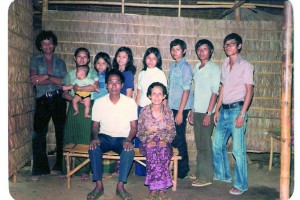The regime that separated Monh from her mother had scattered families, conscripted children barely old enough to walk, and murdered intellectuals. People fell and died on days-long forced marches from the city to the countryside without so much as a jug of water to sustain them.
After four years, the Khmer Rouge fell. Monh, her parents, and her seven siblings – all of whom survived – escaped to refugee camps in Thailand and emigrated to the United States, settling in the suburbs of Washington, D.C.
Tek was born in 1988, and she grew up in Arlington, Va. A high school English teacher introduced her to Mary Washington and guided her through the college application process.
The seeds sown by Monh and tended by Tek sprouted, and blossomed, at UMW.

Sany Nhem (in skirt) and five of her children in 1983, after they came to the U.S. The family had survived forced labor, starvation rations, and the genocide that killed nearly one-quarter of the Cambodian people. Sophi Monh, who is just to the right of her mother, was only 8 years old when the Khmer Rouge took power.
During her freshman year, she joined the University’s nationally ranked policy debate team.
Timothy O’Donnell, debate director and associate professor of communication, said Tek established herself early as dedicated, hardworking, and passionate. She could debate U.S. energy policy as well as human rights issues. But the latter stood out.
“It’s fair to say Farrah was most interested in issues dealing with human rights on an international scale,” O’Donnell said.
